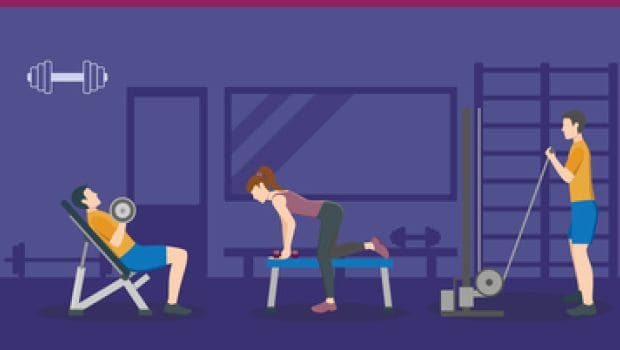Cardio versus Weightlifting: What’s The Best Way to Get Rid of Fat?

The world of fitness is shrouded in myths and misconceptions. One of them would certainly be the association of cardio exercises with weight loss and linking weight training with alpha-human, muscular bodies. Cardio and weight training, both work in tandem to drop kilos and help you get toned. While cardio helps in burning fat, resistance training builds muscles in place of the lost fat. Some recent studies suggest that our metabolism stays high from 24 to 36 hours post a high-intensity workout. In order to lose weight, one should get the basics rights. So how to team cardio and weightlifting? Let’s take a deeper look.Cardio
Needless to say, there are numerous benefits of incorporating cardio training in your fitness regime. It facilitates greater lung function, lower resting heart rate and improves heart health. Cardio training can further be divided into two: High Intensity Interval Training (HIIT), and Low Intensity Steady State (LISS). Traditionally, LISS is known to help more calories as compared to HIIT. HIIT is normally done for shorter bouts of time and is known to facilitate greater calorie loss post workout. HIIT enables greater use of gym time and effective fat burn.
 Weight Training
Weight Training
Strength training is of the utmost importance in building muscle. Lean muscle tissue will enable burning more calories. 1 kilogram of lean muscle burns 50 extra calories over the same amount of fat which will burn only three calories a day. There are many ways to incorporate strength training in your fitness regime. Body-weight training, for example, pitches your own body weight against it. Then there are methods and techniques such as drop sets, super sets, giant sets among others that help raise the core body temperature and employ more muscle fibre to work; this results in greater calories loss and fat burn.
Pitch them against each other or make them live in harmony?
Neglecting your cardiovascular system will eventually harm your resistance also. A poor cardiovascular system will obstruct your performance in the long term. Though you can be exceptionally good at both, one would need to figure out a plan where both forms of fitness would complement each other and give you maximum results.
 Introducing one to two intense cardio sessions to your fitness plan will help your heart and lungs and make them more efficient. Cardio facilitates greater oxygen supply to the body which helps recover the body and muscles from extreme muscle exhaustion. High intensity workout often causes muscles to shut down. This happens due to the build-up of lactic acid which is nothing but a by-product of lack of oxygenated blood getting into the muscle cells. A healthy cardiovascular system helps the body recover. Cardio therefore helps in transporting more oxygenated blood to the muscles, prolonging that build up on lactic acid. It also helps in improving your stamina, resistance and endurance levels. This complex interplay of cardio and weight training will help you gain muscle mass quickly, and the more lean muscle you will have, the more calories you will burn when at rest.
Introducing one to two intense cardio sessions to your fitness plan will help your heart and lungs and make them more efficient. Cardio facilitates greater oxygen supply to the body which helps recover the body and muscles from extreme muscle exhaustion. High intensity workout often causes muscles to shut down. This happens due to the build-up of lactic acid which is nothing but a by-product of lack of oxygenated blood getting into the muscle cells. A healthy cardiovascular system helps the body recover. Cardio therefore helps in transporting more oxygenated blood to the muscles, prolonging that build up on lactic acid. It also helps in improving your stamina, resistance and endurance levels. This complex interplay of cardio and weight training will help you gain muscle mass quickly, and the more lean muscle you will have, the more calories you will burn when at rest.
Ask your fitness trainer to design an exciting combination of cardio and resistance training as a part of your routine. Not only will this help your body get a sculpted, chiselled look but also benefit your heart and lungs which will deliver more oxygen-rich blood through to the muscles. You will therefore be able to fight plateaus and unveil the better you – leaner, stronger and healthier.
[“source-ndtv”]
